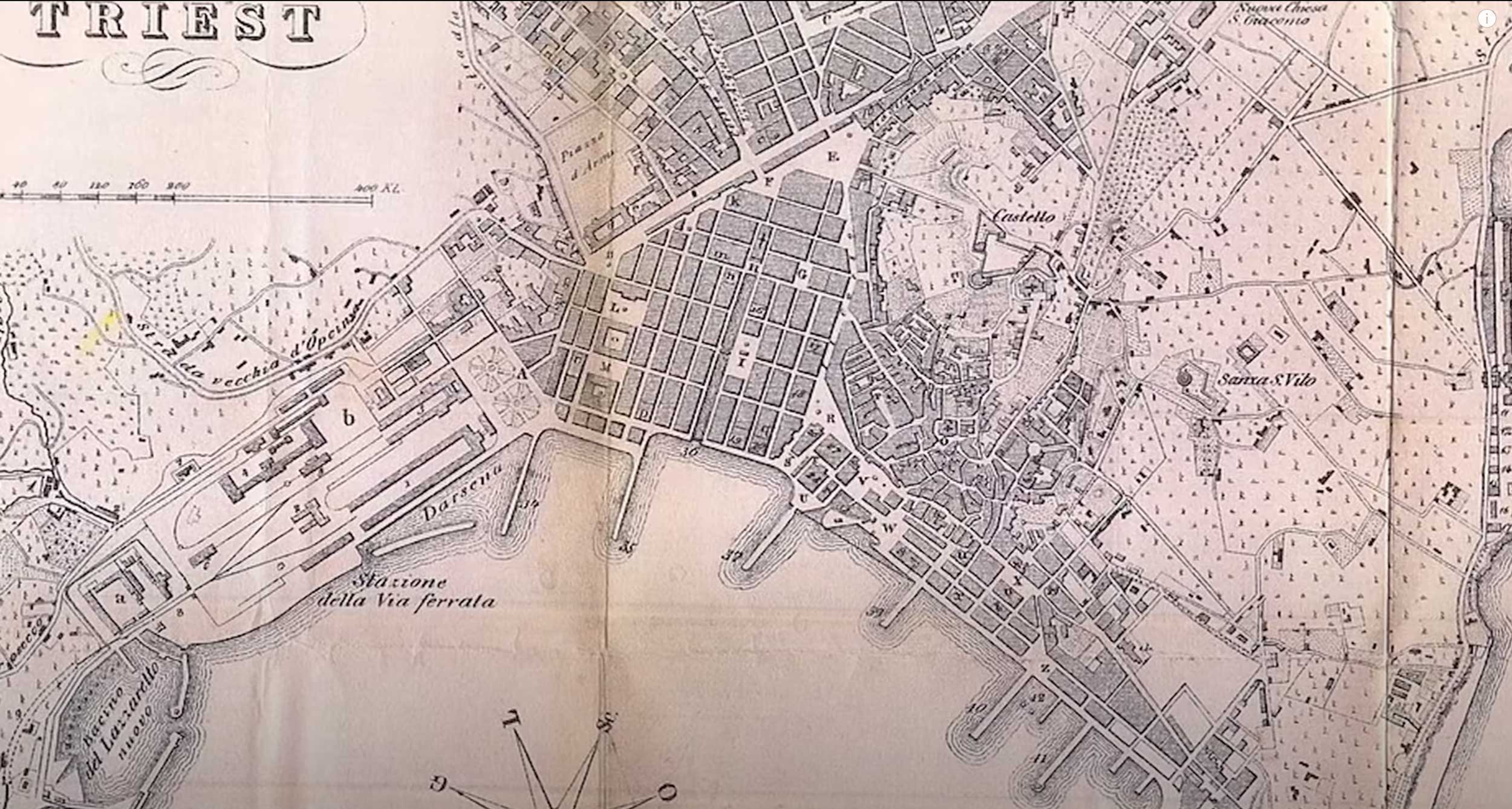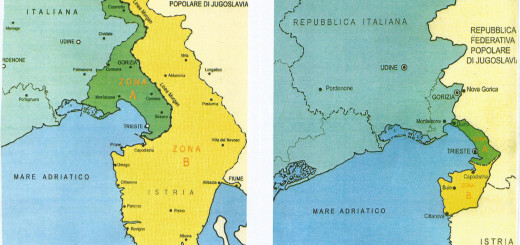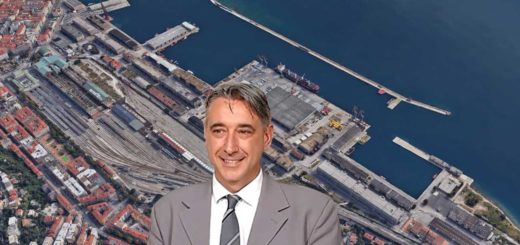History Hustle Channel on YouTube explains the birth of the Free Territory of Trieste (FTT or TLT) in a video documentary.
The Free Territory of Trieste was the result between a dispute between the West and the East, between the United States and the Soviet Union, between Italy and Yugoslavia. Once part of the Austro-Hungarian Empire the Italians took it after World War One was over. However, after the Second World War the new Yugoslav state, led by Josip Broz Tito claimed it. British Gen. Sir William Morgan proposed a temporarily solution and the Morgan Line was created. The Tito–Stalin split (Yugoslav–Soviet split) put an end to the tensions. It was formalized much later in 1975 by the Treaty of Osimo. The history of Trieste is a forgotten episode in history of the Cold War.
PARIS PEACE TREATY – ANNEX VIII
INSTRUMENT FOR THE FREE PORT OF TRIESTE
ARTICLE 1
In order to ensure that the port and transit facilities of Trieste will be available for use on an equal footing by all international trade and by Yugoslavia, Italy and the Central European States, in the manner as is customary in other free ports of the world: a) There shall be a customs-free port in the Free Territory of Trieste within the limits foreseen by or established in accordance with article 3 of this Instrument. b) The goods that will pass through the Free Port of Trieste will enjoy the freedom of transit as stipulated by article 16 of this Instrument. The international Free Port regime will be governed by the conditions of this Instrument.
ARTICLE 2
The Free Port is established and administered as a state corporation of the Free Territory, having all the attributes of a legal person and functioning in accordance with the conditions of this Instrument. All Italian state and parastatal properties within the limits of the Free Port, in accordance with the conditions of this treaty, which will pass to the FTT will be transferred, without payment, to the Free Port.
ARTICLE 3
The Free Port area includes the territory and installations of the free zones of the port of Trieste within the limits of the 1939 borders. The establishment of special zones in the Free Port under the exclusive jurisdiction of any State is incompatible with the status of the Territory Libero and the Free Port. In order, however, to cater for the needs of Yugoslav and Italian maritime traffic in the Adriatic, the Director of the Free Port, at the request of the Yugoslav and Italian Governments and with the concurring opinion of the International Commission referred to in Article 21 below, may reserve to merchant ships flying the flags of the respective two States the exclusive use of berthing spaces within certain parts of the Free Port area.
ARTICLE 4
Except as otherwise provided in this Instrument the laws and regulations in force in the Free Territory shall be applicable to persons and property within the boundaries of the Free Port and the authorities responsible for their enforcement in the Free Territory shall exercise their duties within the limits of the Port Free.
ARTICLE 5
Merchant ships and cargo of all countries shall be permitted unrestricted access to the Free Port for loading and unloading both of goods in transit and of goods destined for or coming from the Free Territory. With respect to import or export from or in transit through the Free Port, the authorities of the Free Territory may not impose, on such goods, customs duties or payments other than those imposed for services rendered. However, for goods imported through the Free Port for consumption within the Free Territory or exported from this Territory through the Free Port, the appropriate laws and regulations in force in the Free Territory shall apply.
ARTICLE 6
Storage, warehousing, inspection, sorting, packing and repacking and similar activities which are usually conducted in the free zones of the port of Trieste will be permitted in the Free Port under the general provisions established by the Director of the Free Port.
ARTICLE 7
The Director of the Free Port may also allow the processing of goods in the Free Port. Manufacturing activities in the Free Port will be allowed to those companies which already existed in the free zones of the port of Trieste prior to the entry into force of this Instrument. Upon proposal of the Director of the Free Port, the Government Council may permit the establishment of new manufacturing enterprises within the limits of the Free Port.
ARTICLE 8
Inspections by the Free Territory authorities shall be permitted within the Free Port to the extent necessary to enforce customs and other Free Territory regulations for the prevention of smuggling.
ARTICLE 9
The authorities of the Free Territory shall have the right to fix and collect port dues in the Free Port. The Director of the Free Port sets all prices for the use of the facilities and services of the Free Port. These prices must be reasonable and related to the costs of operation, administration, maintenance and development of the Free Port.
ARTICLE 10
In setting and collecting, in the Free Port, the port dues and other charges referred to in Article 9, as well as in the provision of the services and facilities of the Free Port, there shall be no discrimination as to the nationality of the vessels, the ownership of the goods or on any other grounds.
ARTICLE 11
The passage of all persons in or out of the Free Port area shall be subject to the provisions established by the authorities of the Free Territory. These arrangements, however, shall be made so as not to unduly impede the passage in and out of the Free Port of nationals of any State who are engaged in any legitimate business in the Free Port area.
ARTICLE 12
The internal rules and laws in force in the Free Port and similarly the price lists imposed in the Free Port must be made public.
ARTICLE 13
The cabotage trade and cabotage trade within the Free Territory shall be carried on in accordance with the provisions issued by the authorities of the Free Territory, the conditions of the present Instrument being not considered to impose on such authorities any restrictions in this respect.
ARTICLE 14
Within the boundaries of the Free Port, measures for the safeguarding of health and measures to combat animal and plant diseases in respect of ships and cargoes shall be enforced by the authorities of the Free Territory.
ARTICLE 15
It shall be the duty of the authorities of the Free Territory to supply the Free Port with supplies of water, gas, electricity, communications, sanitation and other public services and also to ensure public safety and fire brigades.
ARTICLE 16
Freedom of transit shall be in accordance with customary international agreements, guaranteed by the Free Territory and by the States whose territories are crossed by goods transported by rail between the Free Port and the Served States, without any discrimination and exempt from customs duties or other charges than those imposed for services rendered. The Free Territory and the States which have undertaken the obligations of the present Instrument through which territories pass traffic in transit from both directions will do everything in their power to provide the best possible facilities with all due respect to the fastest and most efficient movement of goods, at a reasonable price and will not apply to the movement of goods to and from the Free Port any discriminatory measures with respect to tariffs, services, customs, health, police or other provisions. States which have undertaken the obligations of this Instrument shall not take measures concerning provisions or tariffs which could artificially divert traffic from the Free Port to the benefit of other seaports. Measures taken by the Government of Yugoslavia which provide for traffic on ports in southern Yugoslavia are not considered as measures designed for artificial diversion of traffic.
ARTICLE 17
The Free Territory and the States which have undertaken the obligations of the present Instrument shall, within their respective territories and on non-discriminatory terms, in accordance with customary international agreements, secure, freedom of postal, telegraphic and telephone communication between the Free Port area and all countries creating communications originating from or for the Free Port area.
ARTICLE 18
The administration of the Free Port is to be carried out by the Director of the Free Port who represents it as a legal entity. The Governing Council will present to the Governor a list of qualified candidates for the post of Director of the Free Port. The Governor will appoint the Director from among candidates presented to him after consultation with the Governing Council. In case of disagreement, the matter is referred to the Security Council. The Governor has the power to dismiss the Director at the request of the International Commission or the Governing Council. The Director must not be a Yugoslav or Italian citizen. All other employees of the Free Port will be nominated by the Director. In all recruitment of personnel preference shall be given to citizens of the Free Territory.
ARTICLE 19
Subject to the provisions of this Instrument, the Director of the Free Port shall take all reasonable and necessary measures for the administration, operation, maintenance and development of the Free Port as an efficient port suitable for the immediate handling of all traffic in this port. In particular, the Director is responsible for the execution of all types of port works in the Free Port, directs the operations of port facilities and other port equipment, establishes, in accordance with the legislation of the Free Territory, the working conditions in the Port Libero, and supervises the execution in the Free Port of the orders and regulations of the authorities of the Free Territory with respect to navigation.
ARTICLE 20
The Director of the Free Port will issue such internal regulations and laws if he considers it necessary in the exercise of his functions as prescribed by the previous article. The independent budget of the Free Port shall be drawn up by the Director, and shall be approved and implemented in accordance with the legislation which is established by the People’s Assembly of the Free Territory. The Director of the Free Port presents an annual report of the operations of the Free Port to the Governor and the Governing Council of the Free Territory. A copy of the report is forwarded to the International Commission.
ARTICLE 21
An International Commission of the Free Port shall be established, hereinafter called “The International Commission”, consisting of a representative of the Free Territory of Trieste and of each of the following States: France, the United Kingdom of Great Britain and Ireland of the North, the Union of Soviet Socialist Republics, the United States of America, the Federal Republic of Yugoslavia, Italy, Czechoslovakia, Poland, Switzerland, Austria and Hungary, provided that such States have assumed the obligations of this Instrument. The representative of the Free Territory will be the Permanent President of the International Commission. In the event of a tie vote, the vote given by the President will be decisive.
ARTICLE 22
The International Commission will have its headquarters in the Free Port. Its offices and activities will be exempt from local jurisdiction. The members and officials of the International Commission shall enjoy in the Free Territory such privileges and immunities as are necessary for the exercise of their functions. The International Commission will decide on its secretariat, procedures and budget. The common expenses of the International Commission shall be divided among the member states on an equitable basis as agreed by them through the International Commission.
ARTICLE 23
The International Commission has the right to investigate and consider all matters relating to the operations, use, and administration of the Free Port or to the technical aspects of transit between the Free Port and the States it serves, including the standardization of management procedures. . The International Commission acts on its own initiative or on matters brought to its attention by any State or by the Free Territory or by the Director of the Free Port. The International Commission will communicate its observations or recommendations on these matters to the State or States concerned, or to the Free Territory, or to the Director of the Free Port. These recommendations must be taken into consideration and the necessary measures must be taken. Should the Free Territory or the State or States concerned deem, however,
ARTICLE 24
Any dispute concerning the interpretation or execution of this Instrument, not settled by direct negotiation, shall, unless the parties mutually agree on other means of settlement, shall be submitted at the request of either party to the dispute to a Commission composed of a representative of each party and a third member chosen by mutual agreement of the two parties from nationals of a third country. If the two parties fail to agree within a period of one month on the appointment of the third member, the Secretary-General of the United Nations may be requested by either party to proceed with the appointment. The decision taken by the majority of the members of the Commission will be the decision of the Commission, and will be accepted by the parties as final and binding.
ARTICLE 25
Proposals for amendments to the present Instrument may be submitted to the Security Council through the Governing Council of the Free Territory or by three or more States represented by the International Commission. An amendment approved by the Security Council will enter into force on the date set by the Security Council.
ARTICLE 26
Given the purposes of the present Instrument, a State is considered to have assumed the obligations of the present Instrument if it is a party to the Treaty of Peace with Italy or has in turn notified the Government of the Republic of France of the assumption of these obligations.
Il presente documentario potrebbe risultare incompleto e/o inesatto in alcune sue parti. Vi rimandiamo ai testi ufficiali delle Nazioni Unite e del Trattato di Pace di Parigi per un eventuale approfondimento.


















